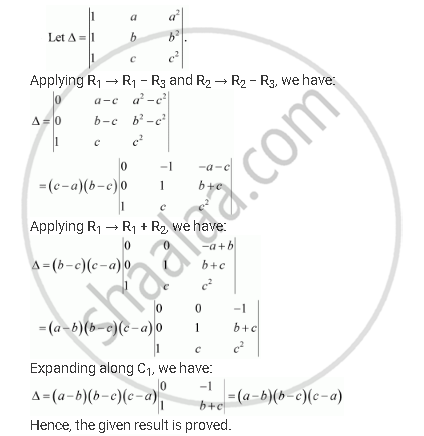Advertisements
Advertisements
प्रश्न
By using properties of determinants, show that:
`|(1,a,a^2),(1,b,b^2),(1,c,c^2)| = (a - b)(b-c)(c-a)`
उत्तर

APPEARS IN
संबंधित प्रश्न
Using properties of determinants, prove that `|[2y,y-z-x,2y],[2z,2z,z-x-y],[x-y-z,2x,2x]|=(x+y+z)^3`
Using the properties of determinants, prove the following:
`|[1,x,x+1],[2x,x(x-1),x(x+1)],[3x(1-x),x(x-1)(x-2),x(x+1)(x-1)]|=6x^2(1-x^2)`
Using the property of determinants and without expanding, prove that:
`|(1, bc, a(b+c)),(1, ca, b(c+a)),(1, ab, c(a+b))| = 0`
Using properties of determinants, prove that:
`|(x, x^2, 1+px^3),(y, y^2, 1+py^3),(z, z^2, 1+pz^2)|` = (1 + pxyz) (x – y) (y – z) (z – x), where p is any scalar.
Using properties of determinants, prove that
`|(sin alpha, cos alpha, cos(alpha+ delta)),(sin beta, cos beta, cos (beta + delta)),(sin gamma, cos gamma, cos (gamma+ delta))| = 0`
Using properties of determinants, prove that
`|(a^2 + 2a,2a + 1,1),(2a+1,a+2, 1),(3, 3, 1)| = (a - 1)^3`
Using properties of determinants, prove that `|(1,1,1+3x),(1+3y, 1,1),(1,1+3z,1)| = 9(3xyz + xy + yz+ zx)`
Using properties of determinants, prove that:
`|(1+a^2-b^2, 2ab, -2b),(2ab, 1-a^2+b^2, 2a),(2b, -2a, 1-a^2-b^2)| = (1 + a^2 + b^2)^3`
Using properties of determinants show that
`[[1,1,1+x],[1,1+y,1],[1+z,1,1]] = xyz+ yz +zx+xy.`
Prove the following using properties of determinants :
\[\begin{vmatrix}a + b + 2c & a & b \\ c & b + c + 2a & b \\ c & a & c + a + 2b\end{vmatrix} = 2\left( a + b + c \right) {}^3\]
Using properties of determinants, show that `|("a" + "b", "a", "b"),("a", "a" + "c", "c"),("b", "c", "b" + "c")|` = 4abc.
If `|(4 + x, 4 - x, 4 - x),(4 - x, 4 + x, 4 - x),(4 - x, 4 - x, 4 + x)|` = 0, then find the values of x.
Prove that `|(x + y, y + z, z + x),(z + x, x + y, y + z),(y + z, z + x, x + y)| = 2|(x, y, z),(z, x, y),(y, z, x)|`
Select the correct option from the given alternatives:
Let D = `|(sintheta*cosphi, sintheta*sinphi, costheta),(costheta*cosphi, costheta*sinphi, -sintheta),(-sintheta*sinphi, sintheta*cosphi, 0)|` then
Select the correct option from the given alternatives:
The system 3x – y + 4z = 3, x + 2y – 3z = –2 and 6x + 5y + λz = –3 has at least one Solution when
The value of `|(1, 1, 1),(""^"n""C"_1, ""^("n" + 2)"C"_1, ""^("n" + 4)"C"_1),(""^"n""C"_2, ""^("n" + 2)"C"_2, ""^("n" + 4)"C"_2)|` is 8.
Evaluate: `|(x + 4, x, x),(x, x + 4, x),(x, x, x + 4)|`
Evaluate: `|("a" - "b" - "c", 2"a", 2"a"),(2"b", "b" - "c" - "a", 2"b"),(2"c", 2"c", "c" - "a" - "b")|`
Prove that: `|("a"^2 + 2"a", 2"a" + 1, 1),(2"a" + 1, "a" + 2, 1),(3, 3, 1)| = ("a" - 1)^3`
Find the value of θ satisfying `[(1, 1, sin3theta),(-4, 3, cos2theta),(7, -7, -2)]` = 0
The maximum value of Δ = `|(1, 1, 1),(1, 1 + sin theta, 1),(1 + cos theta, 1, 1)|` is ______. (θ is real number)
The value of the determinant `|(x , x + y, x + 2y),(x + 2y, x, x + y),(x + y, x + 2y, x)|` is ______.
If x, y, z ∈ R, then the value of determinant `|((2x^2 + 2^(-x))^2, (2^x - 2^(-x))^2, 1),((3^x + 3^(-x))^2, (3^x -3^(-x))^2, 1),((4^x + 4^(-x))^2, (4^x - 4^(-x))^2, 1)|` is equal to ______.
The determinant `|(sin"A", cos"A", sin"A" + cos"B"),(sin"B", cos"A", sin"B" + cos"B"),(sin"C", cos"A", sin"C" + cos"B")|` is equal to zero.
Let Δ = `|("a", "p", x),("b", "q", y),("c", "r", z)|` = 16, then Δ1 = `|("p" + x, "a" + x, "a" + "p"),("q" + y, "b" + y, "b" + "q"),("r" + z, "c" + z, "c" + "r")|` = 32.
The A.M., H.M. and G.M. between two numbers are `144/15`, 15 and 12, but not necessarily in this order then, H.M., G.M. and A.M. respectively are
If f(α) = `[(cosα, -sinα, 0),(sinα, cosα, 0),(0, 0, 1)]`, prove that f(α) . f(– β) = f(α – β).
Without expanding evaluate the following determinant.
`|(1, a, a + c),(1, b, c + a),(1, c, a + b)|`
By using properties of determinant prove that
`|(x+ y,y+z, z+x ),(z, x,y),(1,1,1)|` = 0
By using properties of determinant prove that `|(x+y,y+z,z+x),(z,x,y),(1,1,1)|` = 0
Without expanding evaluate the following determinant.
`|(1,"a","b+c"),(1,"b","c+a"),(1,"c","a+b")|`
Without expanding evaluate the following determinant.
`|(1, a, b+c), (1, b, c+a), (1, c, a+b)|`
The value of the determinant of a matrix A of order 3 is 3. If C is the matrix of cofactors of the matrix A, then what is the value of determinant of C2?
